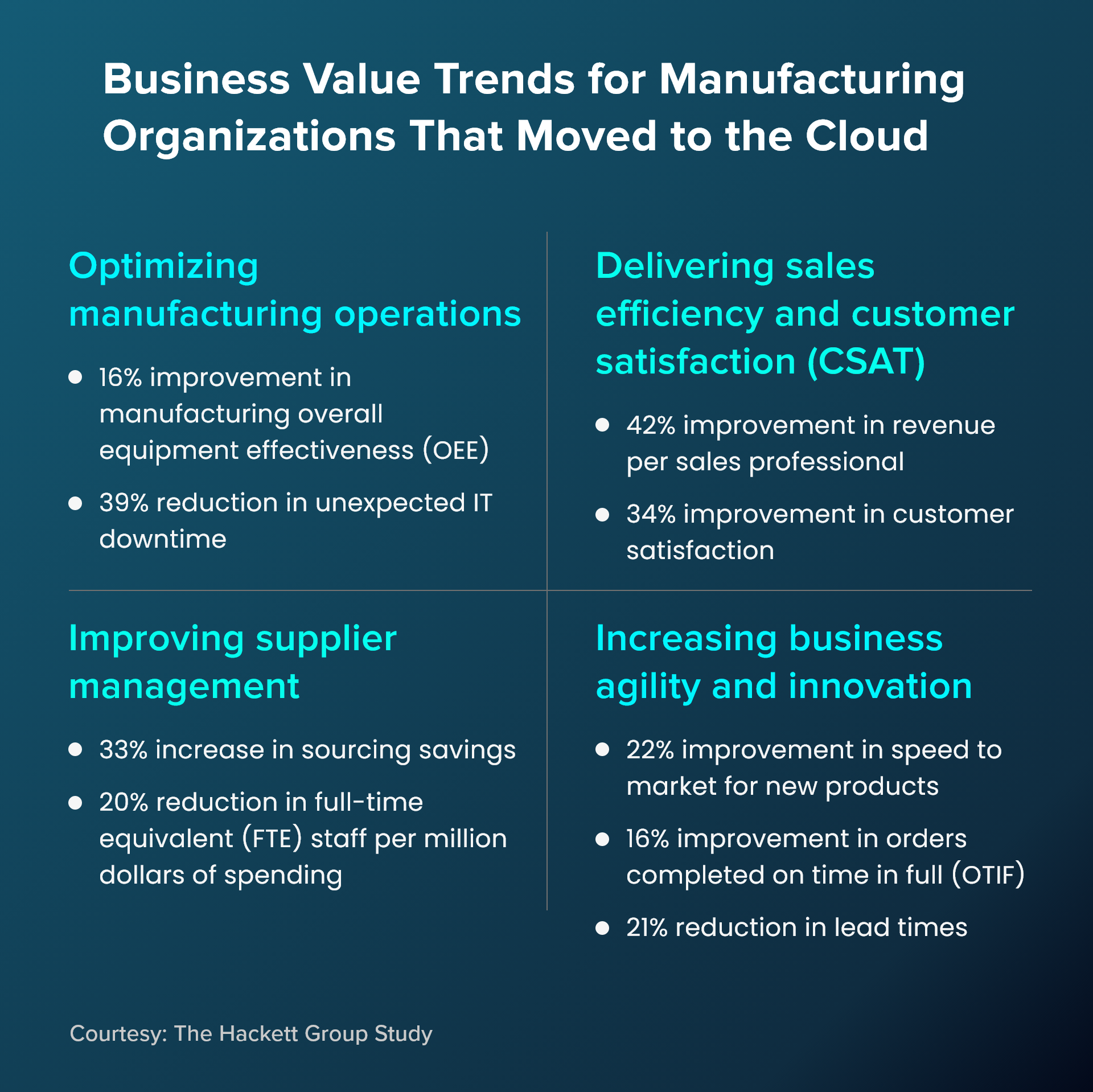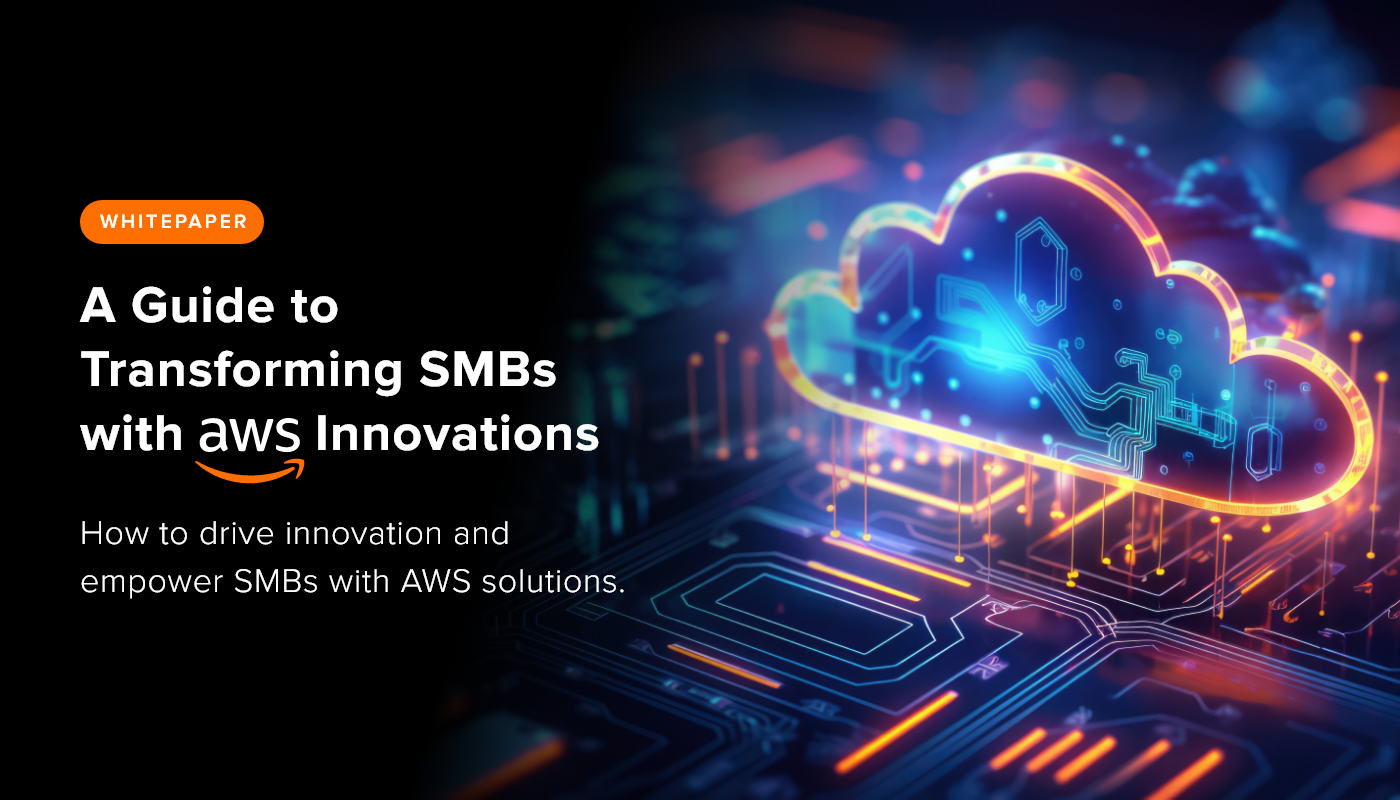Manufacturing companies are choosing cloud-based solutions to address challenges with on-premise data management, lack of visibility into the supply chain and battle other key areas like infrastructure cost, rising raw material costs, and more. Cloud computing provides services to modernize manufacturing operations by offering large computing power, data storage and processing, and making decisions based on its insights.
What Cloud Computing Introduces into Manufacturing

Cost optimization
Cloud computing removes the necessity for manufacturers to overprovision resources to their IT infrastructure to meet peak demand. Instead, resources are scaled and allocated as needed. Unlike on-premise solutions with upfront infrastructure costs, cloud allows manufacturers to pay only for the resources they use (storage, computing power), resulting in cost savings by paying only what is utilized and eliminating the purchase, setup, configuration, and maintenance of on-premise infrastructure.
Scalability
Cloud solutions can be effortlessly scaled to accommodate long-term business expansion and handle temporary fluctuations in demand. Even small disruptions due to overextension in manufacturing can cause enormous losses. Cloud storage scales seamlessly to accommodate growing data volumes generated by various manufacturing processes, equipment sensors, and production tracking systems. This eliminates the need for constant hardware upgrades and integrations and prevents latency from infrastructure provisioning or overburdened storage and servers.
Improved troubleshooting
Quickly identifying and addressing issues prevents costly production interruptions. Cloud-based tools continuously monitor equipment and processes, providing real-time alerts for anomalies, allowing for immediate intervention, and preventing major breakdowns. Cloud platforms enable remote access to historical and real-time data, allowing engineers and technicians to diagnose issues from anywhere, regardless of physical location. By analyzing past data and trends, cloud tools can predict potential equipment failures before they occur.
Data storage and processing
Large data storage is essential for implementing cutting edge technologies like Artificial Intelligence, Machine Learning, and Industrial Internet of Things (IIoT) connectivity. Cloud storage makes data accessible from anywhere, anytime, allowing authorized personnel across different departments (engineering, production, logistics) to access and analyze real-time data remotely. The scalable nature of cloud assists in providing as many storage and backup required to extract, tag, and store data.
Security
A breach in manufacturing IT systems can disrupt operations and compromise product quality. Cloud providers offer strong security measures, including encryption, multi-factor authentication, and constant monitoring. Unlike on-premises solutions, cloud software receives regular updates and patches to address security vulnerabilities. Cloud providers invest heavily in robust security infrastructure and disaster recovery plans. This ensures data protection against cyber threats, accidental deletion, and natural disasters, a crucial factor considering the sensitive nature of manufacturing data.
Global reach
Cloud providers offer a global network, enabling manufacturers to connect systems globally and effortlessly expand operations. This eliminates the need for on-site visits for minor issues, saving time and resources.
Use Cases of Cloud Computing in Manufacturing
Manufacturers utilize cloud-based solutions to aid in planning, executing, and overseeing their entire operations. Let’s explore some practical applications and advantages of cloud computing in contemporary manufacturing:
Machine monitoring
Machine monitoring in manufacturing involves utilizing sensors to gather data from crucial equipment in the production process. Cloud-based IoT platforms enable real-time access to machine data directly from the shop floor. This approach grants manufacturers immediate visibility into their manufacturing operations, offering insights into machine availability, productivity, energy consumption, maintenance needs, and the quality of production. The collected data provides actionable information, encompassing comprehensive OEE (Overall Equipment Effectiveness) and TEEP (Total Effective Equipment Performance) loss metrics, pinpointing areas for impactful process improvements.
Supply chain management
Cloud computing plays a vital role in streamlining supply chain management processes, starting from procurement and material planning to final product delivery. By leveraging cloud solutions for supply chain management, organizations gain access to real-time data from warehouses, transportation networks, and distribution centers, providing a comprehensive overview of the entire supply chain, including its patterns and potential bottlenecks. Automation of inventory management through technologies like barcode scanning and Internet of Things (IoT) sensors enables timely identification of critical stock levels in warehouses and stores. This automation facilitates efficient logistics management by managing vehicle movements, optimizing delivery routes for maximum effectiveness, and automating document completion through customizable templates that require only basic information input and verification. Manufacturing companies adopting cloud-based solutions in their production processes benefit from advantages such as cost-effectiveness, scalability, flexibility, enhanced visibility, and more.
Smart factory
Smart factories and smart manufacturing are integral components of the technological shift referred to as Industry 4.0 or the Fourth Industrial Revolution. A Smart Factory, stemming from the Industrial Internet of Things (IIoT), envisions a production setting where all systems are fully automated and intelligent, allowing for the management of facilities, machinery, and logistics chains without human involvement. Cloud connectivity plays a vital role in enabling seamless data flow throughout the smart factory, offering real-time insights and enterprise-wide transparency. With operational data expanding rapidly, cloud-based solutions play a critical role in ensuring the effectiveness of smart factories by facilitating data collection, analysis, and scalability.
Real World Implementation of Cloud Computing in Manufacturing
Here are some case studies on successful implementation of cloud by manufacturing giants:
GE
GE implemented cloud manufacturing to enhance supply chain management by leveraging cloud-based tools like warehouse management, sourcing, and procurement modules. This transition to cloud supply chain software allowed for improved supplier quality, forecasting accuracy, and inventory optimization while reducing manufacturing cycle times. Cloud connectivity facilitated real-time data flow across the smart factory, enabling seamless information sharing and enterprise-wide visibility. The adoption of cloud solutions in supply chain management has allowed GE to enhance operational efficiency by 20% and responsiveness in GE’s manufacturing operations
Adidas
Adidas revolutionized product customization by integrating cloud-based solutions into their manufacturing platform. This transformation included creating a cloud-based consumer experience for personalized discounts and early access to new releases. By leveraging real-time data insights and machine learning capabilities like Amazon SageMaker, Adidas streamlined the design process, incorporating consumer feedback swiftly. The use of digital twins further accelerated product development, reduced costs, and fostered collaboration. Additionally, the Adidas app, powered by artificial intelligence and Salesforce technology, delivers personalized shopping experiences with tailored product recommendations and real-time updates on sports, athletes, and products of interest.
Procter & Gamble (P&G)
Procter & Gamble (P&G) partnered with Microsoft to leverage the Azure platform for digital manufacturing, aiming to enhance scalable predictive quality, predictive maintenance, controlled release, touchless operations, and manufacturing sustainability optimization across more than 100 manufacturing sites. This collaboration marks the first time P&G can digitize and integrate data from its manufacturing sites, utilizing machine learning and edge computing services for real-time visibility. This partnership will enable P&G employees to analyze production data and leverage artificial intelligence to make immediate decisions, optimize manufacturing environmental sustainability efforts, and increase workforce efficiency and productivity.
Conclusion
Currently, small and large-scale manufacturing industries are actively adopting cloud transformation. Implementing cloud computing for manufacturing can significantly improve your business by reducing costs and enhancing efficiency. The manufacturing industry relies on smooth and quick operations, and better delivery leads to increased customer satisfaction, ultimately improving the overall business reputation. Cloud computing for manufacturing ensures seamless connectivity among all stakeholders.





